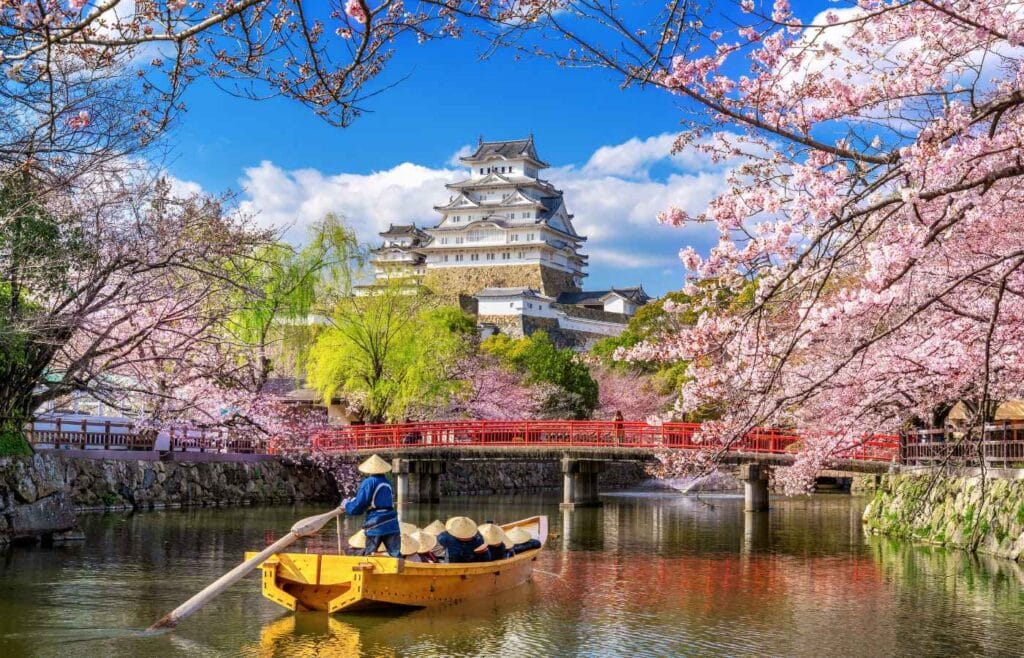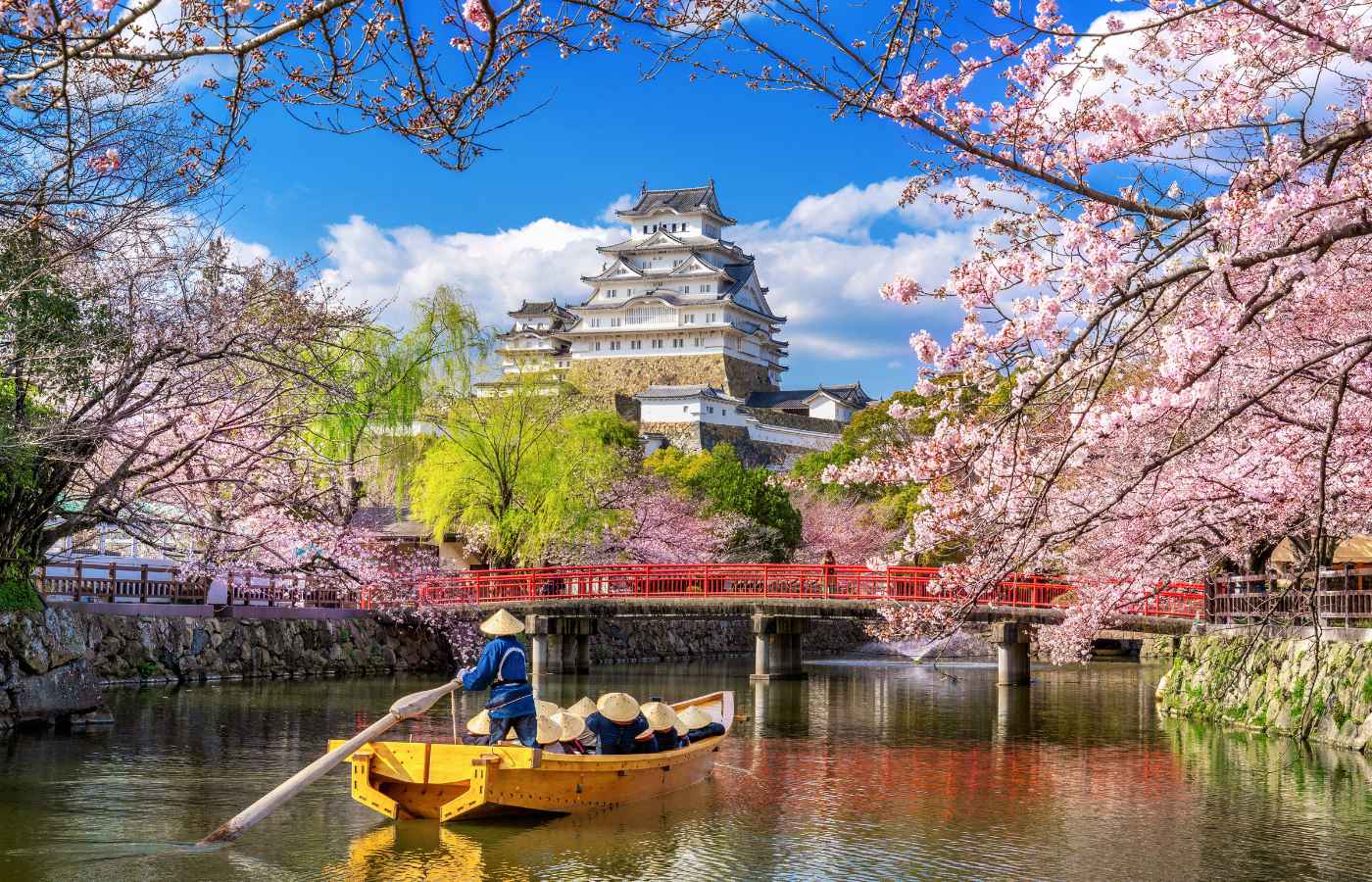Hey there, Blossom Bunch! 🌸 Are you expecting a tiny sprout soon and dreaming of a beautiful floral name?
You’ve come to the right place! We’ve put together a list of more than 25 Japanese baby girl names with beautiful meanings associated with flowers.

Whether you’re looking for a traditional Japanese name or something more modern, this guide offers you a blooming garden of options perfect for your little flower bud.
Each listing includes the Japanese characters, the pronunciation, the name’s significance, and a description of why it might be a good choice for your little bud.
So without further ado, let’s dive into the world of Japanese baby names—each as unique and timeless as a family heirloom.
Sakura (さくら)
- Pronunciation: Sah-koo-rah
- Significance: The name means “cherry blossom,” in the Japanese language, a quintessential symbol of spring and renewal in Japan.
- Gender: Girl
- Description: Cherry blossoms are an important cultural symbol in Japan, signifying the transient nature of life. It is the national flower of Japan. “Sakura” is frequently used in poetry, songs, and celebrations like the famous “Hanami” or cherry blossom viewing festivals. Naming your little girl Sakura would resonate deeply with these cultural and natural elements.
Hana (はな)
- Pronunciation: Hah-nah
- Significance: Literally translates to “flower.”
- Gender: Girl
- Description: Hana is one of the most straightforward yet deeply expressive names in Japanese. It is the Japanese word for flower. It encapsulates the beauty and essence of flowers as a whole, making it a versatile name that’s widely loved and easily understood.
Ayame (あやめ)
- Pronunciation: Ah-yah-meh
- Significance: This name means “iris,” a flower symbolizing good news and hope.
- Gender: Girl
- Description: The iris flower is often seen in traditional Japanese gardens and is subject to various artworks and poems. Your daughter named Ayame could be a symbol of hope and good tidings, just like the iris flower she is named after.
Tsubaki (つばき)
- Pronunciation: Tsoo-bah-kee
- Significance: Refers to the “camellia flower,” which symbolizes love and adoration.
- Gender: Girl
- Description: Camellia flowers have been cultivated in Japan for centuries and are often associated with the tea ceremony, a cornerstone of Japanese culture. Naming your child Tsubaki not only evokes beauty but also the rich cultural history associated with the flower.
Renge (れんげ)
- Pronunciation: Ren-geh
- Significance: Translates to “lotus blossom,” representing purity and enlightenment.
- Gender: Girl
- Description: The lotus flower holds spiritual significance in various Asian traditions, including Buddhism, symbolizing purity and enlightenment. A name like Renge suggests a life of wisdom and spiritual depth.
Azami (あざみ)
- Pronunciation: Ah-zah-mee
- Significance: Means “thistle flower,” symbolizing defiance and protection.
- Gender: Girl
- Description: Thistles are hardy plants that can grow in difficult conditions, symbolizing resilience and defiance. A girl named Azami is expected to have a strong spirit and the ability to thrive even in challenging situations.
Himawari (ひまわり)
- Pronunciation: Hee-mah-wah-ree
- Significance: Means “sunflower,” embodying brightness and positivity.
- Gender: Girl
- Description: Sunflowers are known for turning their heads towards the sun, a behavior that has made them a symbol of positivity and optimism. The name Himawari would be fitting for a cheerful, sun-loving child.
Yuri (ゆり)
- Pronunciation: Yoo-ree
- Significance: Refers to the “lily,” symbolizing purity and renewal.
- Gender: Girl
- Description: Lilies are often used in various cultural practices, including weddings and other ceremonies, to signify purity and a fresh start. Yuri would be a beautiful name for a girl who brings renewal and purity into the lives of those around her.
Hasu (はす)
- Pronunciation: Hah-soo
- Significance: Means “lotus,” representing spiritual enlightenment.
- Gender: Girl
- Description: Like Renge, Hasu also connects to the lotus flower, which is rich in spiritual symbolism. It’s a timeless name, signifying the eternal cycle of birth and rebirth, making it meaningful on both personal and cosmic levels.
Momo (もも)
- Pronunciation: Moh-moh
- Significance: Translates to “peach blossom,” symbolizing happiness and longevity.
- Gender: Girl
- Description: In both Japanese and Chinese traditions, the peach blossom is considered an auspicious symbol, bringing good fortune and longevity. The name Momo captures these attributes, promising a life of joy and long-lasting happiness.
Kiku (きく)
- Pronunciation: Kee-koo
- Significance: Means “chrysanthemum,” symbolizing longevity and rejuvenation.
- Gender: Girl
- Description: Chrysanthemum is a culturally significant flower in Japan, celebrated annually with the “Chrysanthemum Festival.” This meaningful name brings to mind this rich cultural heritage, symbolizing both longevity and nobility.
Yuriko (ゆりこ)
- Pronunciation: Yoo-ree-koh
- Significance: Means “child of the lily.”
- Gender: Girl
- Description: Adding the “ko” suffix, meaning child, creates a more tender, familial variation of the name Yuri. Its special meaning beautifully encapsulates the essence of being the ‘child of the lily,’ adding both a poetic and personal touch.
Sumika (すみか)
- Pronunciation: Soo-mee-kah
- Significance: Translates to “flower blossom.”
- Gender: Girl
- Description: This name of Japanese origin directly means ‘flower blossom,’ but Sumika also evokes imagery of a serene home or a peaceful space, adding an additional layer of meaning and tranquility to the name.
Fuuka (ふうか)
- Pronunciation: Foo-kah
- Significance: Means “flower of the wind.”
- Gender: Girl
- Description: The name suggests a free-spirited individual, akin to a flower carried gently by the wind. Fuuka could be an apt name for a daughter who brings spontaneity and a sense of adventure to your life.
Ran (らん)
- Pronunciation: Rahn
- Significance: Means “orchid,” symbolizing beauty and refinement.
- Gender: Girl
- Description: Orchids are admired for their exotic beauty and refinement. The name Ran evokes a sense of sophistication and exotic beauty, making it suitable for a girl who is both beautiful and unique.
Shion (しおん)
- Pronunciation: Shee-on
- Significance: Refers to “aster,” a flower symbolizing patience and elegance.
- Gender: Girl
- Description: Asters bloom in the fall, a season associated with the beauty of change and maturity. The name Shion captures the flower’s unique blend of elegance and patient blooming, symbolizing someone who comes into their own over time.
Asuka (あすか)
- Pronunciation: Ah-soo-kah
- Significance: Means “fragrance of tomorrow’s flower.”
- Gender: Girl
- Description: The name carries the promise of a future as fragrant as a blooming flower, making Asuka an optimistic and forward-looking choice.
Hinata (ひなた)
- Pronunciation: Hee-nah-tah
- Significance: Though it means “sunny place,” it’s often associated with sunflowers.
- Gender: Girl
- Description: Hinata evokes imagery of a warm, sunlit space, which makes it perfect for a girl who brings warmth and light to your life.
Naoko (なおこ)
- Pronunciation: Nah-oh-koh
- Significance: Translates to “honest flower child.”
- Gender: Girl
- Description: The name carries the virtue of honesty, making Naoko an excellent choice for someone who values integrity and straightforwardness.
Haru (はる)
- Pronunciation: Hah-roo
- Significance: Though it means “spring,” it’s closely linked with springtime flowers.
- Gender: Girl
- Description: Haru is synonymous with the rebirth and rejuvenation that comes with spring. The name conjures images of fields in full bloom and trees sprouting new leaves.
Kanna (かんな)
- Pronunciation: Kahn-nah
- Significance: Means “flower,” simple yet striking.
- Gender: Girl
- Description: Like Hana, the name Kanna encapsulates the simplicity and beauty of a flower, but it does so with a slightly more rhythmic and melodious tone.
Yuka (ゆか)
- Pronunciation: Yoo-kah
- Significance: Translates to “gentle flower.”
- Gender: Girl
- Description: The name Yuka paints a picture of a flower that is delicate but resilient, much like how you’d expect a girl with this name to grow into a strong yet gentle woman.
Maika (まいか)
- Pronunciation: My-kah
- Significance: Means “dance of the flower.”
- Gender: Girl
- Description: Maika is a rhythmic and evocative name that captures the essence of a flower swaying or ‘dancing’ in the wind. It’s a poetic name suited for a girl with a vibrant personality.
Suzuran (すずらん)
- Pronunciation: Soo-zoo-rahn
- Significance: Refers to the “lily of the valley,” symbolizing the return of happiness.
- Gender: Girl
- Description: The lily of the valley is known for its delicate, bell-shaped flowers and sweet fragrance. The name Suzuran embodies the spirit of joy and happiness that comes after enduring hardships.
Kohana (こはな)
- Pronunciation: Koh-hah-nah
- Significance: Means “little flower,” evoking a sense of innocence and purity.
- Gender: Girl
- Description: Kohana is an endearing name that brings to mind the image of a small but captivating flower, embodying the pure essence of childhood innocence.
Ayaka (あやか)
- Pronunciation: Ah-yah-kah
- Significance: Refers to “colorful flower.”
- Gender: Girl
- Description: Much like a bouquet of mixed flowers, Ayaka symbolizes a vibrant, multifaceted personality that brings joy to everyone around her.
Misaki (みさき)
- Pronunciation: Mee-sah-kee
- Significance: Though commonly meaning “cape” as in a coastal feature, it can also refer to a “beautiful blossom.”
- Gender: Girl
- Description: Misaki blends the natural beauty of both land and flora, making it a poetic name for a girl who embodies the richness of nature.
Kaede (かえで)
- Pronunciation: Kah-eh-deh
- Significance: Refers to the “maple,” often associated with the fall foliage.
- Gender: Girl
- Description: The name Kaede conjures images of the breathtaking colors of autumn leaves. It’s a name that celebrates the beauty in change and transition.
Aoi (あおい)
- Pronunciation: Ah-oh-ee
- Significance: Can mean “blue,” but is also a type of flower called “hollyhock.”
- Gender: Girl
- Description: Aoi’s dual meanings offer a rich tapestry of interpretation, ranging from the serenity of the color blue to the subtle complexity of the hollyhock flower.
Sayuri (さゆり)
- Pronunciation: Sah-yoo-ree
- Significance: Can mean “small lily,” symbolizing purity and beauty.
- Gender: Girl
- Description: Derived from ‘sayu,’ meaning “small,” and ‘uri,’ meaning “lily,” Sayuri is an intimate and delicate name that embodies both purity and beauty.
Hinagiku (ひなぎく)
- Pronunciation: Hee-nah-gee-koo
- Significance: Means “daisy.”
- Gender: Girl
- Description: The name Hinagiku captures the quintessence of a daisy, a flower often associated with purity, innocence, and simplicity. In Japanese culture, daisies are considered symbols of unblemished beauty and are often used to represent new beginnings or the uncorrupted essence of youth.
Asagao (朝顔)
Pronunciation: Ah-sah-gah-oh
Significance: The name means “morning glory,” a flower symbolizing affection and the ephemeral nature of love or life.
Gender: Girl
Description: If you’re enchanted by the transient beauty of morning glories that bloom at dawn only to fade by the afternoon, Asagao could be the poetic and meaningful name you’re looking for. It speaks to the fleeting, yet profoundly beautiful, moments that life has to offer. Ideal for parents seeking a name that balances both cultural depth and whimsical charm.
Why Japanese Flower Names?
Japan is a country steeped in tradition and symbolism, and flowers are no exception.
From the cherry blossoms that inspire “hanami” (flower-viewing parties) to the resilient chrysanthemums symbolizing the Emperor, flowers are more than just pretty petals for the Japanese people; they’re a rich tapestry of culture and different meanings.
The Japanese history of floral names dates back to the Heian period and even earlier, though in recent years they have become particularly popular. Names like Sakura and Hana have been common names for generations but have maintained their allure.
Some of the most popular flowers like cherry blossoms and peonies have found their way into being some of the most popular Japanese girl names. Names like Sakura, which refers to the blossoms of the Japanese apricot tree, are deeply ingrained in the Japanese culture.
In Western culture, the language of flowers is well-known. A yellow rose signifies friendship, while a white rose stands for purity. In Japan, this floral language, or ‘Hanakotoba,’ has various meanings. For example, a red camellia signifies being in love, while white flowers often symbolize purity.
So why not gift your bundle of joy with a name as meaningful as it is melodious?
Buckle your garden boots and let’s explore this vibrant list of names:
Famous People with Flower-Inspired Japanese Names 🌸
Sakura (さくら)
Sakura Ando: A prominent Japanese actress, Sakura Ando has been featured in critically acclaimed films such as “Shoplifters” (2018), which won the Palme d’Or at the Cannes Film Festival. Her name reflects the delicate beauty and renewal that the cherry blossom signifies in Japanese culture.
Hana (はな)
Hana Sugisaki: An up-and-coming Japanese actress, Hana Sugisaki has gained attention for her roles in films like “Bleach” and “Mary and the Witch’s Flower.” She embodies the simple, yet profound beauty that her name signifies.
Ayame (あやめ)
Ayame Goriki: A versatile actress and model, Ayame Goriki has taken on various roles in Japanese dramas and films. Like the iris flower, her career seems to symbolize hope and good news in the Japanese entertainment industry.
Yuri (ゆり)
Yuri Ebihara: A Japanese model and actress, Yuri Ebihara has graced many magazine covers in Japan. Her name captures the purity and renewal symbolized by the lily.
Momo (もも)
Momo Yaoyorozu: Though a fictional character from the anime “My Hero Academia,” Momo Yaoyorozu has become quite iconic. Her intelligence and resourcefulness are just as charming as her name, which signifies happiness and longevity.
Kiku (きく)
Kiku Sharda: An Indian comedian with a surprisingly floral Japanese name, Kiku Sharda is best known for his work on various Indian television comedy shows. His name means chrysanthemum, which is a symbol of long life and rejuvenation.
Haru (はる)
Haru Kuroki: An award-winning Japanese actress, Haru Kuroki has received numerous accolades, including the Silver Bear for Best Actress at the Berlin International Film Festival. Her name embodies the spirit of spring and the renewal it brings.
Sayuri (さゆり)
Sayuri Yoshinaga: A veteran Japanese actress, Sayuri Yoshinaga has appeared in more than 100 films and received numerous awards. Her name, meaning “small lily,” captures both her elegance and her lasting impact on the Japanese film industry.
Hinata (ひなた)
Hinata Hyuga: Another fictional character, this time from the anime “Naruto,” Hinata Hyuga is beloved by fans worldwide. Her name means “sunny place,” and she shines as bright as any sunflower in her storyline.
Kaede (かえで)
Kaede Matsushima: A former Japanese actress, Kaede Matsushima was a prominent name in the early 2000s. Though her name refers to the maple leaf, its associated beauty mirrors the fall foliage, capturing the essence of a colorful, transient beauty.
Tips on How to Choose a Name for Your Little Bud 🌸
Choosing a name for your newborn is like picking the most beautiful flower in an endless garden of possibilities—it’s both delightful and a wee bit daunting! As parents, you’re the gardeners of your child’s life, so let’s make sure you pick a name that blossoms beautifully. Here are some tips to consider:
- Sound & Syllables: Say the name out loud—several times! Imagine calling it out across a playground or whispering it during bedtime stories. Does it have a harmonious ring to it? If your surname is long, perhaps a shorter first name would create a nice balance.
- Cultural Significance: Japanese names carry profound meanings and cultural nuances. Researching the name’s significance and how it’s viewed in Japan can be an enlightening experience.
- Read it, Write it: Write down the name and look at it on paper. Does it appeal to you visually? If the name is written in Japanese characters, make sure to understand their meaning—each stroke adds a layer of significance.
- Family Ties: If you have Japanese heritage or familial ties to Japan, you might want to consult with older family members. They might offer insights that you hadn’t considered.
- Spelling & Pronunciation: Remember, your child might need to spell their name over the phone one day or listen to it being called in a busy waiting room. Is the name straightforward to spell and pronounce?
- Uniqueness & Popularity: Some parents prefer commonly used names, while others seek something unique. A popular name can provide a sense of community, but a unique name adds a layer of individuality.
- Sibling Harmony: If you have other children, consider how the names sound together. Do they create a harmonious bouquet or clash like weeds?
- Gut Feeling: Sometimes, when a name is right, you can feel it in your bones. Trust your instincts; they’re often your best guide.
- Future-Proofing: Imagine your child at different life stages. Will the name suit a spunky toddler as well as a professional adult?
- Double-Meanings & Initials: Make sure the name doesn’t unintentionally spell or sound like something awkward or undesirable.
Remember, names are like seeds; they carry the essence of your child’s future persona. So, water it with love, nurture it with care, and watch it bloom into a beautiful identity!
Boys Can Be Flowers Too!
While many of these names are suited for baby girls, some like Haru can serve as a gender-neutral name. Although it may not be as common, there’s no reason baby boys can’t have a name that means flower, too.
So there you have it! A splendid garden full of beautiful Japanese names as gorgeous as any red rose.
Whether you’re drawn to the rare beauty of a less common name like Yuriko or the timeless allure of a popular name like Sakura, there’s a floral name for every family. These names don’t just hold a special place in Japanese art and Japanese gardens but also in the lives of people, capturing everything from pure hearts to long-lasting love.
So, sprinkle a little sunshine, water with love, and let the name you choose blossom into a lifetime of happiness for your little one. 🌼
Related Posts:
50 Japanese Names That Mean Light
50 Japanese Baby Names That Mean ‘Star’
50 Japanese Baby Names That Mean ‘Shadow’
100 Best Baby Names That Mean ‘Electric’
100 Baby Girl Names That Mean ‘New Beginning’
100 Baby Names That Mean “Smart”
100 Radiant Baby Names That Mean ‘Light’
Calie Herbst, Editor-in-Chief of Milwaukee With Kids, has spent over a decade combining her experiences as a parent of three to create a hub for Milwaukee’s family adventures.
Her decade-long teaching career in Milwaukee Public Schools and academic background, including a Master’s in Teaching from Marquette University and dual B.A.s in Sociology and Spanish from the University of Wisconsin – Madison, fuel her passion for inclusive and engaging family content.
Calie is also a recognized voice in local media, contributing to WISN Channel 12 News, WTMJ Wisconsin Morning News, Fox 6’s Real Milwaukee, and B93.3.
Discover more about Calie’s journey and editorial approach on her About Page and Editorial Policy Page.









